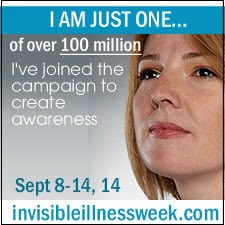1. The illnesses I live with are: POTS, Gastroparesis, Migraines, and Ehlers-Danlos Syndrome
Type III (EDS III). To keep things simple, I usually just say I have “dysautonomia,”
an umbrella term for dysregulation of the autonomic nervous system. For me, “dysautonomia”
covers POTS, gastroparesis, migraines, plus other symptoms of autonomic
dysfunction that I have.
2. I was diagnosed with it in the year: EDS III was first diagnosed sometime around 1992.
POTS was diagnosed in 1995. Gastroparesis was diagnosed in 2007. Migraines were
diagnosed in 2010.
3. But I had symptoms since: EDS III is a genetic condition that I have had since birth. Gastroparesis
symptoms began in 1990. POTS symptoms began in 1994 or earlier. Migraines began
in 2001.
4. The biggest adjustment I’ve had to make is: giving up my hopes and dreams to
embrace God’s plan for my life.
5. Most people assume: Strangers assume that I have hurt my leg and won’t need to
use a wheelchair much longer.
6. The hardest part about mornings is: being stuck in bed and trying to convince my body to
wake up while all around me the world is stirring and busy and active.
7. My favorite medical TV show is: I don’t watch medical TV shows. I find them too stressful.
8. A gadget that I especially appreciate is: my kindle. It makes it possible to
read on days when I otherwise wouldn’t be able.
9. The hardest part about nights is: when I am exhausted, but unable to sleep. This
happens when I don’t get to bed by 8:00 to rest, relax, and wind down. If I don’t
have three hours to relax, then my nervous system is too “wired” to fall asleep.
10. Each day I take just a few pills and a whole lot of vitamins and supplements.
11. Regarding alternative treatments I: will use those that are helpful for me, have a
scientifically reasonable mechanism of action, and do not go against what God
says in His Word.
12. If I had to choose between an invisible illness or a visible illness, I would choose: to leave it in the
Lord’s hands.
13. Regarding working and career: I don’t feel like I am missing out on a career, but I do
wish I had more energy to put into being a wife and mother.
14. People would be surprised to know: that I am much more tired and weak than I appear to
be.
15. The hardest thing to accept about my new reality has been: that I won’t be able to have a lot
of children.
16. Something I never thought I could do with my illness that I did was: have two children.
17. The commercials about my illness: are nonexistent.
18. Something I really miss doing since I was diagnosed is: ice skating, swimming, exercising,
being outside, and generally being active.
19. It was really hard to have to give up: being an in-home caregiver for a
sweet lady with Multiple Sclerosis.
20. A new hobby I have taken up since my diagnosis is: making medical ID bracelets.
21. If I could have one day of feeling normal again I would: take my children ice skating.
22. My illness has taught me: that it is important to take care of our bodies to the best
of our ability, but ultimately our level of health is in the Lord’s hands.
23. Want to know a secret? One thing people say that gets under my skin
is: “You should try
_____. It would probably cure you.”
24. But I love it when people: reach out to me with genuine friendship.
25. My favorite Scripture that gets me through tough times
is: “So we do not
lose heart. Though our outer self is wasting away, our inner self is being
renewed day by day. For this light momentary affliction is preparing for us an
eternal weight of glory beyond all comparison, as we look not to the things
that are seen but to the things that are unseen. For the things that are seen
are transient, but the things that are unseen are eternal.” 2 Corinthians
4:16-18 ESV
26. When someone is diagnosed I’d like to tell them: “I am so sorry. I will be praying for
you, and I’m here if you want or need a safe place to talk.”
27. Something that has surprised me about living with an illness is: that it is much harder than I
thought it would be. Back in my healthier days I saw others living with disabling chronic illnesses, and it seemed a lot easier from the outside looking in.
28. The nicest thing someone did for me when I wasn’t feeling well was: visit occasionally, offer practical
help, and be my friend.
29. I’m involved with Invisible Illness Week because: I believe it is important to spread
awareness of invisible illnesses and how they affect people. I hope this
information will be helpful to someone else who has a chronic illness to let
them know that they are not alone. Or perhaps it will help someone to
understand their friend with a chronic illness better.
30. The fact that you read this list makes me feel: grateful.



No comments:
Post a Comment